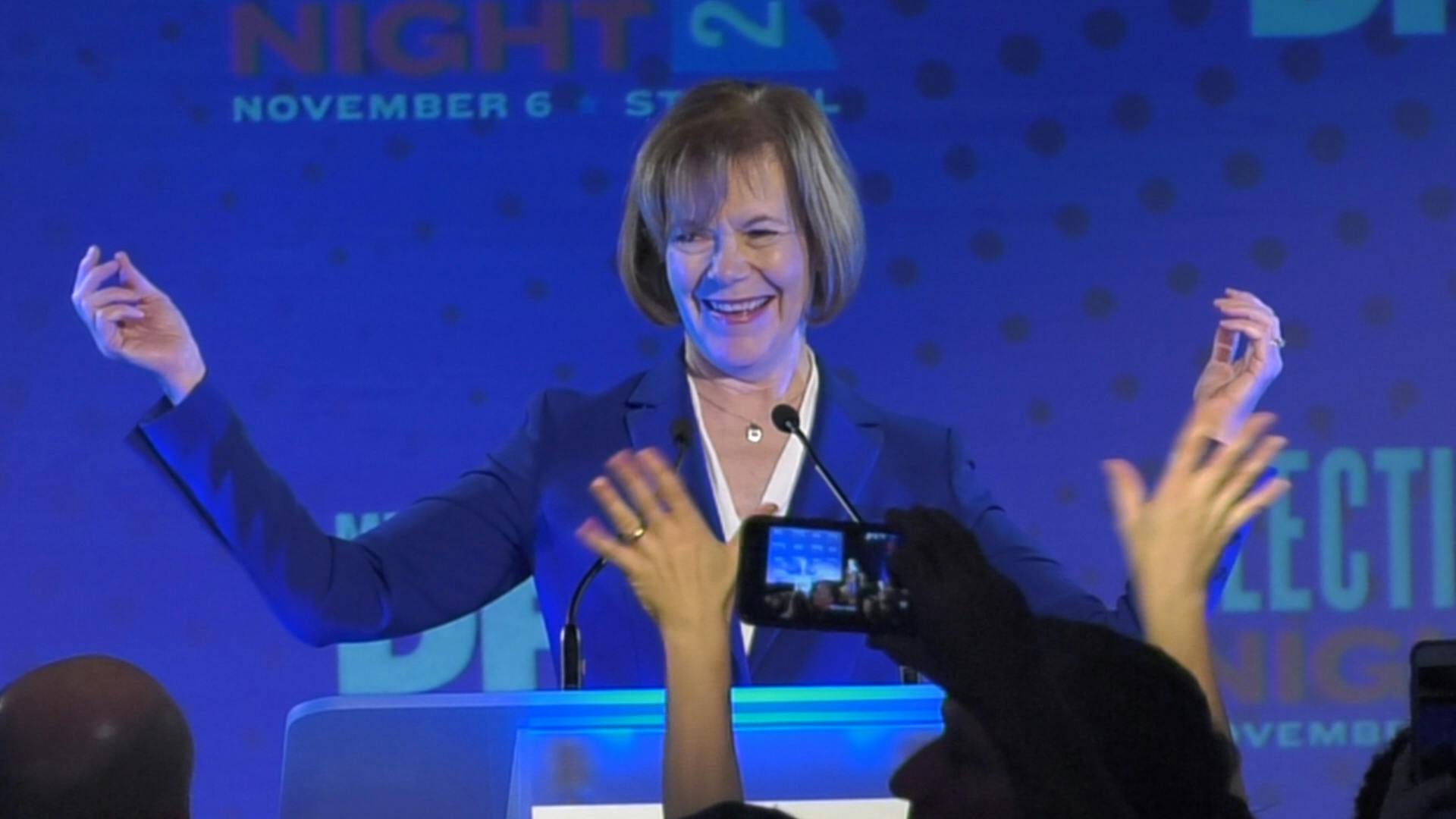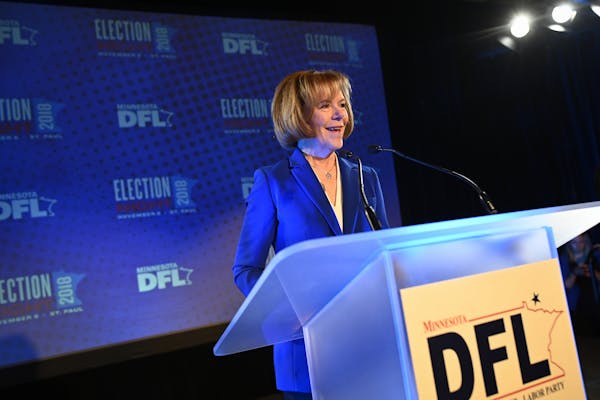Voters sent Democratic Sens. Amy Klobuchar and Tina Smith back to Washington on Tuesday, but Republican victories in other states mean they'll still be in the chamber's minority.
Klobuchar handily won re-election to a third term after a campaign in which she was never really threatened by Republican state Rep. Jim Newberger. Her easy win could amplify buzz about a possible 2020 presidential bid.
"We have to stand up not just for those who voted for us, but for those who didn't," Klobuchar said at a party for Democratic candidates.
Smith defeated Republican state Sen. Karin Housley in a special election and will complete the final two years of the Senate term of Democrat Al Franken, who exited in January after allegations of sexual misconduct. It was the state's first U.S. Senate campaign with two women nominees.
"Tonight we've shown the country that Minnesota should not be underestimated," Smith said at the celebration in St. Paul. "People lifted up their voices and they spoke out."
The two Democratic wins here did not keep Republicans from retaining control of the Senate, where they will try to protect President Donald Trump's agenda. Democrats were poised to take the U.S. House of Representatives and are expected to launch multiple investigations of the administration.
Heading into the election, the Senate had 51 Republicans and 49 Democrats. Democrats were defending 26 of the 35 seats on ballots, including 10 in states that Trump won in 2016. Losses by Democratic Sens. Joe Donnelly of Indiana, Heidi Heitkamp of North Dakota and Claire McCaskill of Missouri ended Democrats' hopes of taking over.
Smith, who was appointed to the seat by outgoing Gov. Mark Dayton, had served as his lieutenant governor and chief of staff. Her campaign focused on her priorities during her short tenure in Washington, including a role in writing the federal farm bill and efforts to reduce opioid abuse.
Housley, who was first elected in 2012 to represent St. Marys Point at the Capitol, was endorsed by Trump and supported many of his policies.
"Senator Smith and I disagree on almost everything, but now is a time to come together and move forward for the good of the state we love," Housley said after conceding.
She was in striking range of Smith in the campaign's final weeks. A Star Tribune/MPR News Minnesota Poll found the incumbent ahead 47 to 41 percent in October. In September, Smith's lead was seven percentage points. The polls had error margins of plus or minus 3.5 points.
With the final ballots yet to be counted Tuesday night, Smith had a shot at matching or surpassing Franken's margin of victory in 2014, when he defeated Republican Mike McFadden, 53 to 43 percent.
She carried the metro area except Anoka County, the northeast part of the state, the Moorhead area, Olmsted County including Rochester, and Blue Earth County including Mankato. Housley won many more of the rural areas.
Smith had a fundraising advantage, raking in $8.1 million through Oct. 17, while Housley's donations totaled $3.8 million.
The closeness of the contest and high stakes prompted spending by national Republican and Democratic organizations on TV ads in the state.
Smith has said that she would run in 2020 for a full six-year term if voters returned her to Washington this fall.
A long shot from the start, Newberger, who is from Becker, was outraised by Klobuchar. She had collected $9.9 million as of Oct. 17 and he had raised just $210,066. That disparity stymied the Republican's ability to buy TV ads to expand his name recognition.
In September, the Star Tribune/MPR News Minnesota Poll found Klobuchar with a huge lead, 60 to 30 percent. A month later, the poll tracked only a slight narrowing, with the Democrat ahead of Newberger 56 to 33 percent.
Klobuchar's highest election showing came in her second race six years ago, when she won 65 percent of votes.
This year, Klobuchar was so confident about the outcome that on election eve, she wasn't campaigning in Minnesota. She was on "The Late Show with Stephen Colbert" and spoke about taking on Trump.
"What do you do when he has that angry emotion?" she said of the president. "You take it head on with positive emotion and that's how you win."
Klobuchar, who has a high-profile seat on the Senate Judiciary Committee, was a key player in the battle over Brett Kavanaugh's nomination to the U.S. Supreme Court. During his confirmation hearing, she asked Kavanaugh if he had ever blacked out from drinking. He turned the question back on her, asking if she had. He later apologized. Klobuchar voted against him.
She has been mentioned as a 2020 presidential prospect. She campaigned with Democratic candidates in Iowa on Oct. 27 and visited the state that holds the nation's first caucuses twice in 2017.
Chuck Chaika, 65, of Burnsville, said he wanted Klobuchar and Housley to win. He's mostly a Democrat, he said, but likes Housley because of her husband, Phil, a former NHL player who now coaches the Buffalo Sabres. Chaika said he's a hockey fan and went to South St. Paul schools like Phil Housley. "I really like their family," he said.
He supported Klobuchar because of her pro-union stance. "She's backing our Teamster union and pension, which is falling apart," said Chaika, a retiree who moonlights as a disc jockey and private bus driver. He voted at Destiny Church in Burnsville.
In Blaine, retired business owner Max Miller voted for Republicans, but Klobuchar was the exception.
He said the top issue for him was communication skills. "They need to be able to work with the opposing party without being rude or restrictive," Miller said after voting at the National Sports Center.
Staff writers Andy Mannix, Erin Adler and Shannon Prather contributed to this report. Judy Keen • 612-673-4234
Former DFL Senate Majority Leader Kari Dziedzic dies of cancer at age 62

How the Star Tribune is covering the 2024 election

Fact check: Walz and Vance made questionable claims during only VP debate

In Tim Walz's home city, opposing groups watch him debate on the national stage


